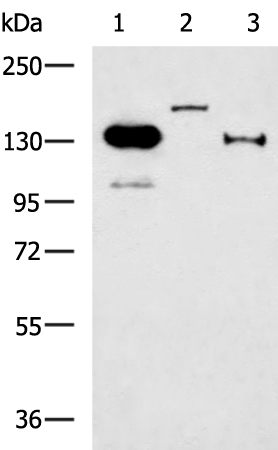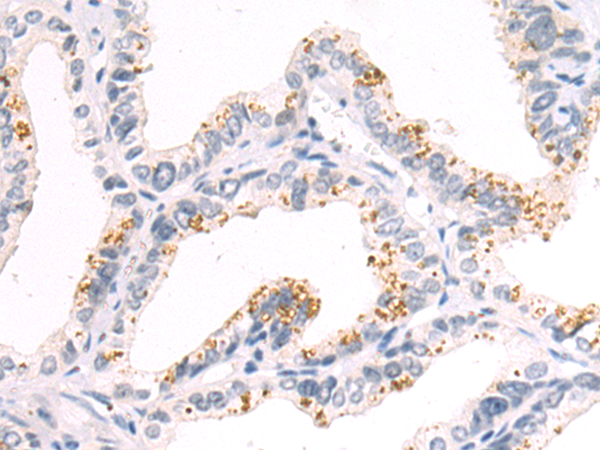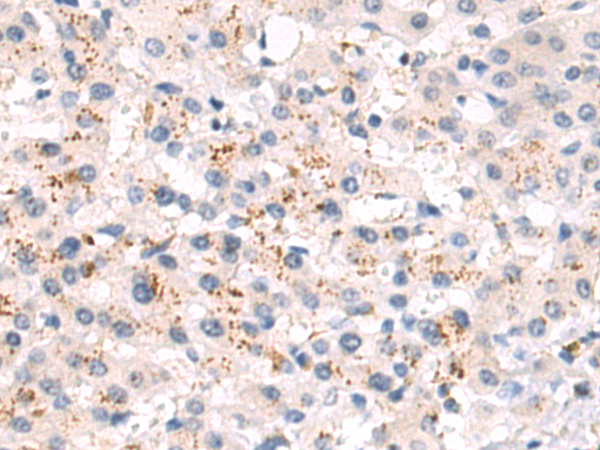


| WB | 咨询技术 | Human,Mouse,Rat |
| IF | 咨询技术 | Human,Mouse,Rat |
| IHC | 1/50-1/200 | Human,Mouse,Rat |
| ICC | 技术咨询 | Human,Mouse,Rat |
| FCM | 咨询技术 | Human,Mouse,Rat |
| Elisa | 1/5000-1/10000 | Human,Mouse,Rat |
| Aliases | NEU; NGL; HER2; TKR1; CD340; HER-2; VSCN2; MLN 19; c-ERB2; c-ERB-2; HER-2/neu |
| WB Predicted band size | 138 kDa |
| Host/Isotype | Rabbit IgG |
| Antibody Type | Primary antibody |
| Storage | Store at 4°C short term. Aliquot and store at -20°C long term. Avoid freeze/thaw cycles. |
| Species Reactivity | Human, Mouse |
| Immunogen | Synthetic peptide of human ERBB2 |
| Formulation | Purified antibody in PBS with 0.05% sodium azide and 50% glycerol. |
+ +
以下是关于ERBB2(HER2)抗体的3篇经典参考文献,涵盖基础研究、治疗机制及临床进展:
1. **文献名称**:*Use of Chemotherapy plus a Monoclonal Antibody against HER2 for Metastatic Breast Cancer That Overexpresses HER2*
**作者**:Slamon, D.J., et al.
**摘要**:这篇2001年发表于《新英格兰医学杂志》的里程碑研究,首次报道了曲妥珠单抗(抗HER2单抗)联合化疗治疗HER2阳性转移性乳腺癌的临床试验结果,显著延长患者生存期,奠定了HER2靶向治疗的基础。
2. **文献名称**:*Lapatinib plus Capecitabine for HER2-Positive Advanced Breast Cancer*
**作者**:Geyer, C.E., et al.
**摘要**:2006年发表于《新英格兰医学杂志》的研究,验证了拉帕替尼(小分子HER2抑制剂)与卡培他滨联合治疗对曲妥珠单抗耐药的HER2阳性乳腺癌患者的疗效,揭示了克服耐药的新策略。
3. **文献名称**:*Trastuzumab Emtansine for HER2-Positive Advanced Breast Cancer*
**作者**:Verma, S., et al.
**摘要**:2012年发表于《新英格兰医学杂志》的III期临床试验,证明抗体药物偶联物T-DM1(曲妥珠单抗联合微管抑制剂)在HER2阳性晚期乳腺癌中的优越疗效与安全性,推动了新型抗体技术的发展。
(可选第4篇)
4. **文献名称**:*Pertuzumab, Trastuzumab, and Docetaxel in HER2-Positive Metastatic Breast Cancer*
**作者**:Baselga, J., et al.
**摘要**:2012年发表于《新英格兰医学杂志》的CLEOPATRA研究,证实帕妥珠单抗(抗HER2二聚化单抗)联合曲妥珠单抗及化疗可显著延长患者无进展生存期,开创了双靶向联合治疗的新模式。
这些文献涵盖了HER2抗体的关键临床突破及机制探索,反映了从单靶向治疗到联合策略的演进。
ERBB2 (also known as HER2/neu) is a receptor tyrosine kinase belonging to the epidermal growth factor receptor (EGFR) family. It plays a critical role in regulating cell proliferation, survival, and differentiation by forming heterodimers with other EGFR members. ERBB2 lacks a direct ligand-binding ability but is the preferred dimerization partner, amplifying signaling pathways like MAPK and PI3K/AKT. Overexpression or amplification of ERBB2 occurs in ~15-30% of breast and gastric cancers, driving aggressive tumor behavior and poor prognosis.
ERBB2-targeted antibodies, such as trastuzumab and pertuzumab, bind to distinct extracellular domains of the receptor. Trastuzumab (a humanized monoclonal antibody) inhibits ligand-independent signaling, promotes receptor internalization, and mediates antibody-dependent cellular cytotoxicity (ADCC). Pertuzumab blocks dimerization with other EGFR members, complementing trastuzumab's mechanism. These antibodies revolutionized HER2-positive cancer treatment, significantly improving survival in metastatic and early-stage settings.
Diagnostically, ERBB2 antibodies are used in immunohistochemistry (IHC) to assess HER2 status, guiding therapy decisions. However, resistance remains a challenge, prompting research into antibody-drug conjugates (e.g., T-DM1. T-DXd) and combination therapies. Ongoing studies explore ERBB2's role in other cancers, expanding its therapeutic potential.
×